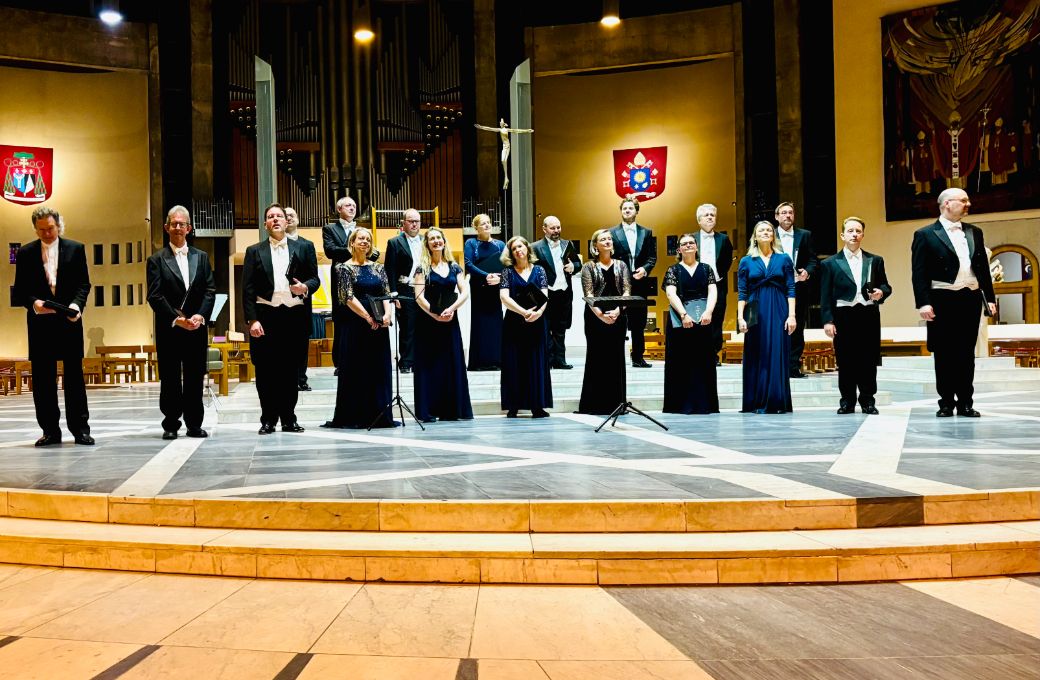Calling this year’s Choral Pilgrimage ‘Angel of Peace’ does not do justice to the creative programming of The Sixteen’s annual tour of cathedrals across the UK. The music of John Taverner and Arvo Pärt are names synonymous with their core repertoire, but Anna Clyne and Will Todd are names less associated with them. However, their music stood equally tall in an extraordinary way.

Standing in the fading myriad of blue light on the steps of the altar of Liverpool’s Metropolitan Cathedral, The Sixteen with violinist Sarah Sexton began their programme with verses 1-4 of Hildegard von Bingen’s Ave, generosa. Playing a drone on the violin, accompanying five sopranos in front of conductor Harry Christophers, they sang the first verse with seraphic beauty. Replacing the violin drone with the altos of the choir, hailing from behind the altar, a solo voice answered with Verse 2, creating a quasi-antiphonal response between what felt like transcendental and earthly spheres. Verses 3 and 4 followed in the same alternating pattern, continuing seamlessly into Pärt’s Tribute to Caesar.
This came with a complete change of colour as the cerulean and cobalt glass of the cathedral began to fade to midnight shades, the bitingly cold dissonances seemed as hard as the white marble on the cathedral floor. The contrasting textures of the piece, from single lines to homophony, echoed around the cavernous rotunda space. The radiance of the final cadence brought warmth, which led judiciously into the piece lending its name to this year’s tour, Todd’s I shall be an angel of peace. Commissioned in 2021 by the Genesis Foundation, this work for solo violin and choir sets words by Cardinal John Newman. The textures and harmonies differed significantly from the works beforehand. The silvery violin line seemed to float ethereally above the wash of choral sound, again with a transcendental feeling, gazing almost spiritually into the lantern of the cathedral above the singer’s heads. Christophers shaped the phrases with much rise and fall, and placed heavy emphasis on key lines of the text such as “I shall not be cast away”.
Closing the first half, Taverner’s Gaude plurimum. This tour de force of Renaissance polyphony played to the strengths and roots of The Sixteen. Set in five parts, Christophers split the voices almost into two choirs which added variety and a different sense of antiphony to this musically complex motet.
After the interval, almost replicating the format of the first half, they began with verses 5-8 of the Ave, generosa, dovetailing once more with Pärt, his Da pacem Domine. His distinctive characterfully tintinnabuli style was something the singers performed with technical and musical brilliance. In a new commission, Clyne’s Orbits was a partner piece to Todd’s (similarly scored for violin and choir), setting words by Rainer Maria Rilke. The violin part is folksy, almost quasi-medieval throughout. The varying choral textures alternate throughout in a lively melodious and innovative work. Returning to Pärt, his Magnificat flowed into Taverner, concluding with a sublimely enchanting performance of O splendor gloriae.
Reflecting back on a complex programme from the melismatic Bingen to the bell-like Pärt, from the polyphony of Taverner to celestial Todd and earthy Clyne – five very contrasting styles, from a quintet of musically varied composers — they knitted together a timeless sequence of glorious and radiant music, executed with sheer perfection.


